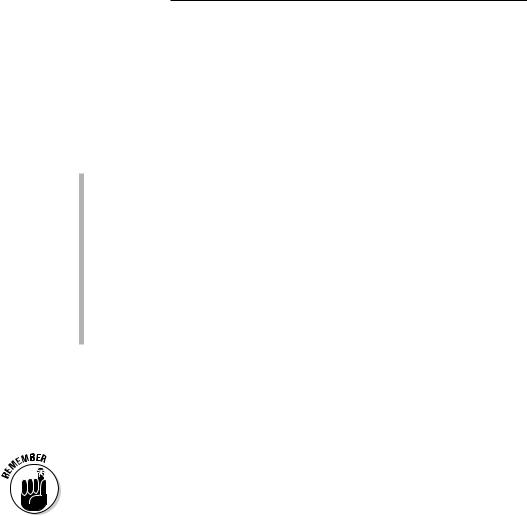
- •About the Author
- •Dedication
- •Author’s Acknowledgments
- •Contents at a Glance
- •Table of Contents
- •Introduction
- •About This Book
- •Conventions Used in This Book
- •How This Book Is Organized
- •Icons Used In This Book
- •Where To Go From Here
- •Understanding Sociology
- •Seeing the World as a Sociologist
- •Social Organization
- •Sociology and Your Life
- •Sociology for Dummies, for Dummies
- •Figuring Out What Sociology Is
- •Discovering Where Sociology Is “Done”
- •So . . . Who Cares about History?
- •The Development of “Sociology”
- •Sociology’s Power Trio
- •Sociology in the 20th Century
- •Sociology Today
- •The Steps of Sociological Research
- •Choosing a Method
- •Analyzing Analytical Tools
- •Preparing For Potential Pitfalls
- •Studying Culture: Makin’ It and Takin’ It
- •Paddling the “Mainstream”
- •Rational — and Irrational — Choices
- •Symbolic Interactionism: Life is a Stage
- •The Strength of Weak Ties
- •Insights from Network Analysis
- •Excavating the Social Strata
- •The Many Means of Inequality
- •Race and Ethnicity
- •Sex and Gender
- •Understanding Religion in History
- •Religion in Theory . . . and in Practice
- •Faith and Freedom in the World Today
- •Criminals in Society
- •The Social Construction of Crime
- •Becoming Deviant
- •Fighting Crime
- •The Corporate Conundrum: Making a Profit Isn’t as Easy — or as Simple — as it Sounds
- •Weber’s Big Idea About Organizations
- •Rational Systems: Bureaucracy at its Purest
- •Natural Systems: We’re Only Human
- •Social Movements: Working for Change
- •Sociology in the City
- •Changing Neighborhoods
- •Life in the City: Perils and Promise
- •The Social Construction of Age
- •Running the Course of Life
- •Taking Care: Health Care and Society
- •Families Past and Present
- •Why Societies Change
- •What Comes Next?
- •Sociology in the Future
- •Randall Collins: Sociological Insight
- •Elijah Anderson: Streetwise
- •Arlie Hochschild: The Second Shift
- •Think Critically About Claims That “Research Proves” One Thing or Another
- •Be Smart About Relationship-Building
- •Learn How to Mobilize a Social Movement
- •Run Your Company Effectively
- •With Hard Work and Determination, Anyone Can Get What They Deserve
- •Our Actions Reflect Our Values
- •We’re Being Brainwashed by the Media
- •Understanding Society is Just a Matter of “Common Sense”
- •Race Doesn’t Matter Any More
- •In Time, Immigrant Families Will Assimilate and Adopt a New Culture
- •Bureaucracy is Dehumanizing
- •People Who Make Bad Choices Are Just Getting the Wrong Messages
- •Index

28 |
Part I: The Basic Basics |
Generalizing answers
Sociological questions are questions about society — but of course, you can’t just look at “society.” You have to look at a society, at specific people in a specific place at a specific time. Still, sociologists want to understand how human society works in general — so they try to ask and answer questions in a way that allow them to generalize as much as possible to other places and times. Here are some examples of sociological questions, and studies that might help provide answers.
Does the extent of discrimination vary by the size of the minority group? A sociologist might look at sexism in companies with different gender ratios — is sexism more or less severe when there are more women in the workforce?
Does the quantity of social ties affect the quality of social ties? A sociologist might conduct interviews to see whether people with more acquaintances overall have as many — or fewer — close friends compared to people with fewer acquaintances overall.
Is inequality inherited? A sociologist might conduct a survey to see whether people raised in poverty grow up to have different jobs than people raised in wealth.
These are big, complicated questions, but they’re questions that do have answers! The trick is finding out what those answers are when your questions are about something as massive as society. It’s not easy, but sociologists are ready for the challenge. (In Chapter 4, I go into more detail about how, specifically, sociological studies are conducted.)
Looking at the previous questions, you probably have guesses as to what the answers are. Your guesses may be right, but remember that they are guesses — these are empirical questions that do have right and wrong answers, and the only way to know for sure is to go out and gather data. Over the course of this book you’ll come across many examples of sociological findings that may surprise you, so you need to be careful not to assume that your guesses about how society works are correct.
Discovering Where Sociology Is “Done”
So who studies sociology? Where are all those sociologists hiding? As it happens, they’re hiding in plain sight; people in many different settings and organizations use sociology to understand society and help solve social problems. Some of these people call themselves sociologists and some of them don’t (depending on their jobs, they might call themselves “researchers” or “program officers” or “reporters”), but they all make use of sociological findings and ideas.

Chapter 2: What Is Sociology, and Why Should I Care? 29
Colleges and universities
The loudest, proudest sociologists are found in institutions of higher learning, where they explicitly teach sociology to (more or less) eager young minds. Many colleges and universities offer undergraduate and graduate degrees in sociology, and coursework in sociology is often a requirement for students majoring in social science (for example economics, psychology, and political science) or in fields where they will be working with people (for example education, social work, and law enforcement). Elective courses in sociology can also be very popular, especially when they deal with interesting subjects like sex and gender, media and culture, or race and immigration.
A lot of sociological research also goes on at colleges and universities, especially at research universities where faculty members are required to have active research agendas. A professor of sociology at a research university might be busy coordinating a team of research assistants working on a major study; training doctoral candidates who will become professors themselves; and teaching undergraduate courses in sociology. Professors with particular specialties may hold joint appointments with other schools (a medical school or law school) or departments (an African-American studies department
or an anthropology department) at the same university. Faculty members, graduate students, and even advanced undergraduate students often travel to sociology conferences where they share their completed or ongoing work with colleagues from other institutions.
Sociology is also taught at many high schools, sometimes under the general heading of “social studies.” It’s relatively unusual for someone to be a fulltime sociology teacher at a high school — but there are the lucky few!
Think tanks and research institutes
Research institutes, sometimes called think tanks, are organizations that focus on research in a particular area. Often they’re more agenda-driven than colleges or universities, and they often receive funding from people who support a certain cause such as:
A political party
Children’s welfare
Women’s rights
Access to health care
A position on abortion
Free trade

30 |
Part I: The Basic Basics |
People with an interest in social issues like these have an interest in gathering facts that will help them accomplish their mission most effectively or garner support for their cause. Trained sociologists who are familiar with research findings and skilled in conducting studies often work at these organizations alongside psychologists, political scientists, experienced journalists, and other experts.
These organizations often publish research reports that can affect policy and rally the public around a cause. When you hear a news report about a current study whose results sound provocative — for example, that a large number of young children have TVs in their rooms — it often comes from an organization like one of these.
Nonprofit organizations
Every nonprofit organization, from Greenpeace to the Girl Scouts to the Boston Ballet, has a mission it is seeking to accomplish, and sociologists often work with these organizations to help them do so most effectively and efficiently.
A Big Brothers/Big Sisters organization, for example, may want to know whether it’s best to pair kids with big “siblings” who have similar backgrounds, or whether it’s more beneficial to introduce kids to mentors from other walks of life who can introduce them to new people and places. A sociologist can help make this decision based on what other sociologists have discovered, or perhaps conduct a study to see what has worked best in other contexts.
The people who do this work may or may not call themselves sociologists, but in systematically gathering and analyzing information about the social world, they are “doing” sociology.
Government
Governments are the biggest non-profits of all, and they face all the same challenges on a much larger scale. At all levels and in all units of government, sociologists can help shape policy and allocate funding so that the many goals of government — from educating children to keeping the peace — are met as successfully as possible.
Legislators turn to sociologists for advice on which programs and policies might be most effective. What can government do to reduce unemployment, to provide for the elderly, to support single parents? Which foreign policy initiatives are likely to be successful? If a neighboring country becomes unstable and dangerous, what should be done to prevent a catastrophic civil war?

Chapter 2: What Is Sociology, and Why Should I Care? 31
Law enforcement officers must use their limited resources to prevent crime from happening and, when it occurs, minimize the damage and apprehend the perpetrators. Is there any way to predict how and when crime will occur? Can criminals be rehabilitated, and how can they
be supported upon their release from jail so that they don’t return to crime?
Social workers in government agencies help people whose lives are made difficult by troublesome social situations — from poverty to family conflicts to health struggles. What are the best strategies for helping people in these situations? Should government provide financial support, food assistance, skills training, or other resources? How much, for how long, and to whom?
Teachers and educational administrators find it enough of a challenge to teach reading, writing, and ‘rithmatic, but also face a host of other social issues. How can bullying be prevented? Why do students drop out of school, and how can schools get them back? Should schools sponsor extracurricular activities — and if so, which ones?
These are just a few of the difficult and important social questions that governmental agencies face. Sociologists — sometimes working directly for these agencies, sometimes coming in as consultants — can help these agencies make well-informed decisions.
Journalism and reporting
I work as a journalist in addition to teaching sociology, so I’ve experienced firsthand how a background in sociology can help inform news reporting.
There are important differences between journalism and sociology. Journalists must publish news much more often, and much more quickly than sociologists, so they usually don’t have time to conduct the kind of systematic study that sociologists prefer. But journalists share sociologists’ interest in understanding what makes society tick, and they’re out on the front lines reporting on social change.
When violence flares up in a particular neighborhood, sociologists can lend perspective and later may conduct a detailed study of the conflict, but journalists have to be there immediately. And a journalist who’s trained in sociology or who knows what sociologists have discovered about violence and urban life is in a good position to understand what is happening even as it unfolds.
Plus, it’s through journalists that the public learns about findings in sociology and other scientific disciplines, so journalists need to be able to think critically about these studies, or they risk misleading readers.

32 |
Part I: The Basic Basics |
When reading a news story, ask yourself what assumptions the reporter is making. Does the story seem to suggest that things “should” be a certain way? If so, that is an opinion or a value judgment rather than a statement of fact. In the case of a crime report, for example, there may empirically be logical reasons for that crime — whether or not you think it “should” have happened. (See Chapter 11 for more on the sociology of crime.)
Business and consulting
Many sociologists at colleges and universities focus on understanding how businesses and the economy work, but businesspeople aren’t about to leave that job entirely to professors! The kind of social analysis that sociologists do is critical to success in business, where the stakes are high and mistakes can be costly. If sociologists are curious about how information flows through different kinds of social networks, you can bet that marketers and retailers are wondering as well. Sociologists need to set aside their personal biases and study a social situation objectively; successful businesspeople understand this as well. Just because you think something is a great idea doesn’t mean it’s actually going to fly with your customers.
Management consultants are similar to sociologists — in fact, they often are sociologists who have earned degrees in the subject. A management consultant’s job is not to be an expert in any one industry, but to look at a company and see how problems with its organization may be keeping it from performing as effectively and efficiently as possible. The success of management consultants is proof of the fundamental sociological principle that something you learn from one social situation may be generalizible to another. Whether you’re Cap’n Jack’s Frozen Fish or Cathy’s Computers, you’re going to face certain challenges that are universal, such as employee motivation, supply chain management, publicity, and advertising.
Everyday life
Let’s face it, it’s not easy being you — or being me, or being anyone in today’s big, complicated, diverse global society. You’re presented with a dizzying array of choices every minute of every day of your life, and whether you’re choosing a husband or choosing a brand of toothpaste, it can be really tough to know what choices to make. Sometimes you just go with your gut feelings, sometimes you act on your detailed knowledge of a particular situation or person, and sometimes you just choose randomly — but a lot of the time, you’re thinking sociologically even if you don’t realize it. Consider these situations:

Chapter 2: What Is Sociology, and Why Should I Care? 33
You’re going to a job interview or an important party, and you want to know how to dress.
You’ve started dating a coworker, and you’re trying to figure out how to reconcile your professional and personal roles.
You’re buying a house, and you want to know what different neighborhoods will be like in ten years’ time.
In each of those situations, you’re thinking sociologically — you’re trying to figure out how society works so you can make it work to your advantage. Sociology affects your life every day. (For specific examples of how you can use sociology in your own life, see Chapter 18.)
Recognizing How Sociology Affects
Your Life and Your World
Okay, sociology is everywhere. So what? Why should you care? What can learning about sociology do for you besides helping you pass a class or make scintillating cocktail-party conversation?
Sociologist Randall Collins uses the phrase sociological insight to describe the way that learning to think sociologically can change your entire perspective on the world. In his book of that title, Collins offers many examples, including the sociological insights that crime is normal (see Chapter 11 of this book) and that being in a relationship is like owning property (see Chapter 6). Understanding these insights doesn’t mean you’re going to stop prosecuting criminals or start treating your husband like a doormat, but it does put people’s behavior in an interesting new light.
Sociological insight may be sociology’s greatest contribution to the world, and it can make a difference in your life as well. In this section I mention several ways that thinking sociologically can make a difference in your life.
Thinking about the social world in an objective, value-free way
When I started teaching sociology at a technical college, the dean made clear to me that my number one job was to help my students critically examine their own beliefs about the social world. The students at that college go on to serve as police officers, nurses, teachers, and therapists — all professions

34 |
Part I: The Basic Basics |
where they’re certain to encounter people from a wide range of backgrounds. Going into any of those careers with cultural blinders on can lead to unfortunate, perhaps even dangerous, misunderstandings. Consider these hypothetical situations:
As a law enforcement officer, you are called to a college campus where neighbors report that a group of boys are skateboarding on a set of concrete benches, making loud noise and damaging the benches. You grew up being told to stay away from “skate punks” who “probably are doing all kinds of drugs” and “have no respect for authority.” When you arrive on the scene, you see the boys — laughing, smoking, cheering one another on as they try to perform complicated tricks.
As a nurse, you see a female patient who seems to have severe discomfort in her abdomen — but she can’t tell you about it directly because she doesn’t speak English. Her husband translates for her in his own imperfect English, and they refuse to allow one of your clinic’s translators to help. “Only I can speak for my wife,” says the husband.
As a teacher, you have a student who regularly misses class and is falling behind in her work. When you call her mother in for a conference, the mother explains that she’s a single parent of three children, and she’s working two jobs to support her family. Sometimes she needs to ask her daughter to skip school to take care of the younger kids. She doesn’t see anything wrong with that. “Family comes first,” she says.
These are all difficult situations, and it’s not obvious what would be the best way to handle any of them. What won’t help, though, in any of these cases, is trusting that your cultural values and norms are the “right” ones, and that anyone who disagrees is wrong. Some might say that the skateboarders are
deviant, that the husband is abusing his wife, and that the mother is exploiting her daughter. Maybe all those things are true, but it’s important to understand that the people you’re dealing with in all those situations may have very different definitions of what constitutes deviance, abuse, and exploitation.
To say that sociology can help you to approach these situations in a “valuefree” way is not to say that you should check your values at the door, but it is to say that sociology can help you understand the difference between your own values and others’ values. No sociologist would say that all criminals are just misunderstood, or that there is no such thing as spousal abuse or child exploitation. Instead a sociologist would emphasize that all those things need to be carefully, objectively defined so that you can deal with people fairly and
sympathetically. Applying terms like “deviance” or “exploitation” shouldn’t be just a matter of “I know it when I see it.” Learning to distance yourself, when necessary, from your own preconceptions is useful in any field of endeavor.

Chapter 2: What Is Sociology, and Why Should I Care? 35
Visualizing connections across times and places
In recent years, sociologists have studied all these topics:
Neighbors’ coordinated efforts to defend Paris when it was under siege in 1871. (Roger V. Gould)
The organization of the Burning Man festival in Nevada’s Black Rock Desert. (Katherine K. Chen)
Women’s mobilization into the Salvadoran Guerrilla Army. (Jocelyn Viterna)
People’s discussions of moral order in Europe during the Reformation and the Enlightenment. (Robert Wuthnow)
Families going through funhouses at an amusement park. (Jack Katz)
That’s just a tiny sampling of the incredibly diverse array of subjects sociologists study. The studies are about wildly different events, places, and times, but they all appeared in mainstream sociological journals or books, meant to be read by all sociologists.
The reason sociologists pay attention to studies about very different subjects is that sociologists believe there are important common elements across
all of human experience. Sociologists believe that the organization of the Burning Man Festival may, if carefully studied, have something to teach us about social organization generally; and that women’s mobilization into the Salvadoran Guerrilla Army may have something to teach us about women’s (and men’s) mobilization into political parties or protest movements anywhere in the world. Revealing the connections and similarities uniting very different places, times, and settings is one of the most powerful and important tasks sociology can do.
Uncovering what really matters . . .
and what doesn’t
The social world is incredibly complicated, and neither sociologists nor anyone else have completely figured out how it works. Sociologists are sometimes criticized for oversimplifying the social world, but believe me, sociologists are painfully aware of just how complicated the social world is! When you spend years of your life trying to design studies that will shed even a little bit of light on a question — such as what causes people to commit

36 |
Part I: The Basic Basics |
crimes — you begin to appreciate how many different factors affect people’s lives and how difficult it can be to say anything that’s generally true about large numbers of people.
That said, sociologists have developed powerful tools to help understand how society works, and sociology can help to cut through the confusion to focus attention on what really matters. Many sociological studies have shown that what people assumed were very important are, in fact, not such a big deal. For example:
Frank Dobbin, Alexandra Kalev, and Erin Kelly studied companies that tried to make their workforces more racially diverse. They found companies that held big, showy diversity training programs became, on average, no more diverse than they’d been before the programs. Companies that actually assigned a person to keep an eye on hiring saw much better results.
Jason Kaufman and I studied high school students’ exposure to the arts, trying to see what made kids more likely to attend competitive colleges. We found that kids whose parents attended art museums were much more likely to attend elite colleges — and that it made no difference whatsoever whether or not the kids even went along!
The “broken windows” theory of policing, famously advocated by New York City mayor Rudy Giuliani in the 1990s, holds that neighborhoods with signs of disorder are more likely sites for crime — that if criminals see a broken window in one building, they figure it’s okay to break a window
in the next. Sociologists Robert J. Sampson and Stephen Raudenbush, though, found that although it’s true that people’s perceptions of a neighborhood’s “disorder” make a difference in the neighborhood’s crime rate, people see evidence of “disorder” not as much in broken windows but in, sad to say, the mere presence of racial minorities like blacks and Latinos.
These studies are examples of how sociologists, rather than oversimplifying the world, have shown exactly how complicated it is. It’s more obvious how people should change their actions based on the diversity-training study than what they should do after learning about the college attendance study or the neighborhood disorder study — parents probably aren’t going to start visiting art museums to make their kids more likely to go to Yale, and police certainly aren’t going to tell African-Americans and Latinos to stay out of sight — but now you know that it’s barking up the wrong tree to drag your kids to museums to make them more attractive college candidates or to spend a lot of money fixing broken windows in hopes of keeping crime down. Sociology can help reveal what really matters, and what really doesn’t.

Chapter 2: What Is Sociology, and Why Should I Care? 37
It’s all in the family . . . or is it?
One of the most controversial sociological arguments about social policy was a report issued in 1965 by Daniel Patrick Moynihan, a social scientist who was then U.S. assistant secretary of labor. The report, a private memorandum to President Lyndon Johnson that was quickly leaked to the press, was called The Negro Family: The Case for National Action. The memo, which became known as “the Moynihan Report,” was Moynihan’s attempt to convince President Johnson to promote marriage and stable family life among African-Americans.
Moynihan saw blacks as still healing from the devastating effects of slavery, which ripped families apart. The high rate of family instability among African-Americans, said Moynihan, caused large numbers of black children to grow up in troubled circumstances, to do poorly in schoolwork and job searches, and to turn to crime and deviance.
Critics of the Moynihan Report said that Moynihan (who was white, and had himself grown up in a poor, single-parent family) was
“blaming the victim” and letting whites off the hook for the racism and discrimination that was doing far more than any private family issues to keep blacks from succeeding in the United States. Others — including Martin Luther King, Jr. — said that Moynihan was right on, and that the government should do more to promote family stability.
To this day, sociologists and lawmakers debate the Moynihan Report. Given that government has limited resources and can’t do everything, should it focus on ending discrimination or on supporting families? And what does “supporting families” even mean? Is there anything government agencies can do to discourage divorce or out-of-wedlock births? Is that the government’s job, or should government stay out of people’s personal lives? The answers weren’t obvious then and aren’t obvious now — but the Moynihan Report has helped inspire decades of sociological research that can help lawmakers make well-informed decisions.
Informing social policy
If you live in a democracy, you’re a policymaker — your vote helps to determine which politicians are elected and which laws are passed. Thinking sociologically can help you to choose wisely.
Every social policy is a sociological argument, whether or not the people who created the policy think about it that way. A social policy is a government action designed to change a society in some way. Knowing which action to take to achieve a certain goal can be difficult, and as politicians and pundits argue about the merits of various pieces of legislation, they are often having sociological debates about how society works, what (if anything . . . but there’s always something) is wrong with it, and how that problem might be fixed.

38 |
Part I: The Basic Basics |
It’s kind of like looking under the hood of a car and trying to figure out what’s making that clanking noise, or why one headlight has mysteriously stopped working. If you don’t know how a car works, you’re going to have a very hard time fixing it — and the same principle applies for society. Without the benefit of sociology and the other social sciences, legislators are just making
rough guesses about what policies might work to lower crime or to help small businesses. (In fact, that was one of the reasons sociology was invented — more about that in Chapter 3.)
Keeping a unique perspective for everyday problems
Sociology is about society rather than about the individual, but it would be a mistake to think that sociology has no bearing on your individual life.
Sociology can be tremendously liberating when you apply it to the society (or societies) you live and work in every day.
You live in a maze of implicit and explicit rules that tell you how to dress, how to act, who to hang out with, who to hook up with, where to go to school, where to work and how to spend the money you make, what car to drive, where to go on vacation, and even where and when to blow your nose. You don’t have to obey those rules, but if you don’t, you risk social disapproval or even — if you break a rule that’s been written into law — imprisonment. The consequences of wearing an unfashionable outfit to a party are just as real as the consequences of walking into a wall.
But unlike the rules of physics, the rules of society can change. If there’s something about society that you don’t like, you can work to make society different. Not only can sociology help you to see different possibilities, it can actually teach you effective strategies for bringing change about. The sociological perspective is refreshing: it acknowledges that things are the way they are for a reason, that the organization of society is no accident — but that things can change, and if you understand how society works, you’re in a much better position to make that change happen.
